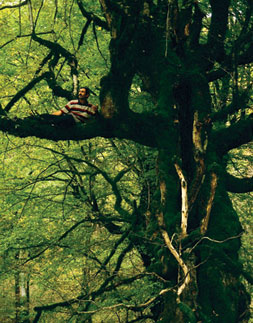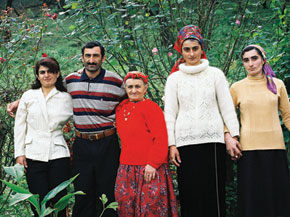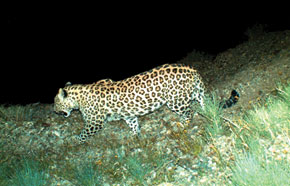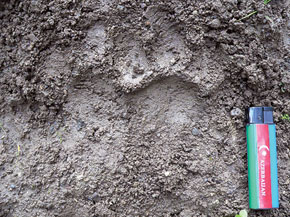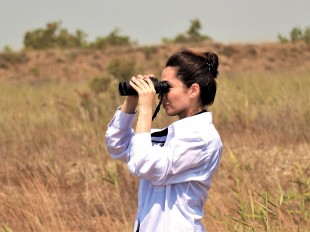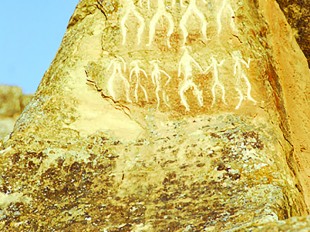I know my chances of seeing the leopard are slim during my two-day stay in Azerbaijan’s Talish Mountains. However, the one thing I know for sure is that I will spend these two days with the man known to everyone at the Worldwide Fund for Nature’s Caucasus Programme offices in Georgia, Armenia and Azerbaijan as ‘Babakhan – the Leopard Man’.
I’m thinking about how it’s going to be as our car crosses the semi-deserted landscape on a rainy day from Baku to Zungulash. This is the village where Babakhan will pick us up for an additional four hours horse ride to his village. My companion is Elshad, a colleague from our Baku office. He knows this area well so, seizing the chance, I ask Elshad numerous questions about Babakhan, the Talish Mountains, the Hirkan forest, his work in Azerbaijan and his people. Surprisingly, after almost 70 years of living back to back in Soviet republics, we still don’t know much about each other. A five-hour car drive seems as good an opportunity as any for filling in the gaps in my knowledge.
I came to Azerbaijan to do some film shooting for WWF Caucasus’ leopard conservation project. The Caucasian Leopard is on the critically endangered list in this region. The latest investigations have shown that the small remaining number of this extremely cautious and highly-mobile large cat survive in the Armenia-Nakhchivan border area and in Azerbaijan’s Talish Mountains.
I watch the scenery miraculously transform before my eyes as we get closer to Zungulash. Now it’s tropically green everywhere. The Talish Mountains, part of the Lesser Caucasus, are along the southern border of Azerbaijan. They divide Azerbaijan and Iran and are a separate range in the south-east of Azerbaijan. The Lenkeran lowland stretches in a narrow band between the foothills of the Talish Mountains and the Caspian Sea.
Elshad tells me to ‘get ready, and after a while our driver indicates that the first leg of our trip is over. Our car stops at a crowded village centre. The rain has stopped but the clouds still hang low. The air smells of wet earth, grass and smoke. People watch us as we sort out our bags and equipment. ‘Here they come,’ says Elshad, and points at two men approaching with broad smiles on their faces. Both are slim, short and muscular. Both sport moustaches and look alike. The one on the right is a bit taller. One of them is Babakhan but I don’t yet know which. Then they greet us. We shake hands. The taller of the two introduces himself – as Babakhan, ‘and this is my brother Raphael.’ We speak Russian, a language that has united us for so many years. They don’t speak Georgian, I don’t speak Azerbaijani and, in addition, Elshad doesn’t speak Talish, the Iranian-rooted language of the area.
They have horses waiting for us and while we get ready Babakhan and Raphael talk to the gathered locals in front of a chaikhana, a teahouse. Soon Elshad joins them and by the time I have attached myself to the crowd they are engaged in heated conversation. ‘Is anything wrong?’ I ask Elshad. ‘No. One guy says his cow was attacked by a leopard and we’re trying to find out whether it really was or not. It often happens that people blame the leopard when a domestic animal vanishes, but it’s not usually the real culprit.’
I watch Babakhan while Elshad is telling me this. His childish eyes are fixed on the listeners, he uses his hands while speaking. Soon it’s over. People pat each other on the shoulders and shake hands. We say goodbye to them and our tiny group leaves the village square.
HIRKAN FOREST
After a kilometre or so I’m already convinced that this is how Paradise must look. A mere description just cannot convey the beauty of the Hirkan forest. For those who need a more scientific portrayal here’s an excerpt from the UNESCO web site:
Hirkan, bearing the ancient name of the Caspian Sea, is a tertiary flora centre and represents a huge unique diversity of flora and fauna. Hirkan forests are the most important refuges for relict forest vegetation. The Hirkan forests are the main climatic barrier and watershed between the Caspian Sea and the arid Iran-Turan plateau. The steep ridges of the Talish mountain system and Elbruz serve as an insuperable barrier of most air accumulated above the Caspian Sea. As a result, the precipitations feed most of the rivers that roll down all along steep slopes and mountain gorges and into the Caspian Sea.
Of course, this is physically accurate, but how to describe the emotions of a person there for the first time? Fairytale! That’s the word that came to my mind and then just refused to leave. ‘Let it be,’ I told myself. ‘A fairytale is not a bad place to find yourself for two days.’
We ride and talk. Babakhan is planning a raid the next day. ‘I just wander around the sections I call the Leopard House. There aren’t many of them, but they are there, these cats know how to be invisible. They love playing games with people. They know us better then we know them.’ Raphael nods and smiles, ‘Yes,’ he says, ‘but they are unaware of how much you know about them.’ Babakhan smiles back. ‘Do I have a chance to see the leopard?’ I ask. ‘You never know,’ says Babakhan. It has started raining again.
PANDEMONIUM
After a three-hour ride we are drawing closer to Siyov, the tiny village where Babakhan and his big family live. He has three brothers and six sisters. His mother and a collection of his own and his brothers’ and sisters’ kids also live there. The house they live in is remote. But then Siyov is not your average village, but rather a settlement. In fact, their house is the only one in the area. The closest neighbours (including some of his brothers and sisters) live two or three kilometres away.
We are definitely expected, but nevertheless our arrival causes pandemonium. Babakhan’s household comes out to greet us: sisters, brothers, wives, kids, grandmother, everybody. It is late and we are fairly tired and hungry. Frankly, I’m expecting a light snack followed by a good sleep; but apparently they have other plans for us. After dinner – chicken in walnut sauce, some bread and tea – the hosts suggest watching a video of Babakhan’s wedding. He and his wife are newly-weds so the enthusiasm has yet to wear off. I hand over some presents I’ve brought for them. We sit cross-legged in the guest room. From time to time, either Elshad or Babakhan explain some obscure details of the Talish wedding ritual to me. Every appearance of either Babakhan or his wife on the screen triggers floods of laughter. I laugh with them. Not because of guest/host etiquette but because their laughter is contagious. During the night, crammed between Elshad, Babakhan and Raphael on the floor, my sleep is dreamless.
I wake up early in the morning of the next day to discover that the weather has changed from rainy to super-shiny. Babakhan and Raphael are performing the morning Namaz. I don’t want to disturb them so I wake Elshad, check the equipment and take a thorough look at the house and yard. Actually, there are several houses: tiny white buildings standing close to each other, plus a hen house and cattle shed. There are also beehives. I already know from Elshad that they have the best honey here. By the time the brothers are finished and we have had our breakfast, the whole household is engrossed in ‘morning duties’. There is plenty to do but they make no objections to me charging about with a camera. Raphael explains that first we should go to the cemetery where all the relatives gather to mark the end of Ramadan.
LEOPARD ENCOUNTER
We are back in the fairytale. Today, the forest is another. Rays of sun shining through the trees make it look different. It smells of childhood. We pass the ruins of an ancient cemetery. Tombstones, half submerged in the ground and almost covered by moss, still reveal their engraved swastikas, axes and bows. Babakhan kindly answers all my questions but I notice that he is also trying to study the area closely. Mostly he looks down, sniffing the air as if he doesn’t trust his eyes alone. I’d heard about his encounter with a leopard years ago and also about the scar that the encounter left on his leg. As soon as he looks back at me I ask him to tell me the story. I even joke that he’s the only man I know who’s actually seen the leopard. Here’s what he tells me:
When I returned from the army I would hear neighbours and relatives grumbling about a leopard killing domestic animals in the neighbourhood. Some said they even knew the animal’s whereabouts but they didn’t dare to find it and kill it. I was impetuous and hot-headed back then. Besides, all the neighbours thought the army should have made me braver, so I said I’d give it a go. I persuaded one of my relatives to come with me and we set off armed with rifles and knives.
It took us two days to find the den and more than 24 hours in ambush… but all in vain. The animal wasn’t there. We were both ‘green’ and knew nothing about leopard behaviour, or indeed anything about leopards at all. We just wanted to kill it and that was that. Anyway, after a prolonged wait, we decided to leave because we were fed up with sitting there in the cold without decent clothes or sufficient food. And that’s when it happened. We were descending rocky terrain when it appeared from out of the blue. No noise. Nothing. I can’t quite recall now how I managed a shot, but the next thing I remember is this huge dotted body coming closer to me. It jumped on me and we both flew off the rocks. It continued to chew on my leg while we were flying. Luckily, the animal landed first with me on top of it. And that was it. It let me go and vanished as fast as it had attacked. All this time my relative had been standing there motionless without realizing what had just happened.
You know something happened that day; something very important. I don’t even know how to explain it; not because I don’t know what it was but because it is not one thing but many things at once. It’s difficult to articulate. Of course, initially I was so livid that I planned to go back and kill the animal once and for all. But the wound gave me time to think about the incident. And then one day I suddenly realized that the anger had left me and I didn’t crave revenge any more. I didn’t want the skin of that animal on my wall anymore, and I didn’t want to walk around bragging about how I’d killed a leopard. I just wanted to leave it where it belonged. It was so beautiful and brave. It had dignity. It had tried to protect its home.
‘That’s how he turned into, as I put it, self-appointed wrath of illegal hunters,’ Elshad added jokingly, ‘and then he met a young university post-graduate who was studying species. And that was the second encounter that changed his life.’
‘So who was that?’ I asked.
‘Me,’ smiled Elshad. We all laughed.
EYES AND EARS
Of course, Babakhan didn’t know much about environmental organizations or even that the leopard was almost extinct in the Caucasus. He was a local who lived with the same hopes and fears as the people living in the area, and for them the leopard was a threat. It attacked their livestock and it had an almost legendary reputation for being a merciless killer. Until recently, in talks with the locals, it was almost impossible to separate the fact from the legend. The leopard was mentioned in the same breath as every disappearance of a domestic animal. Today, three years into the WWF Caucasus project, things have changed in some ways. Now the locals know far more about the animal, its behaviour and its importance. But clashes still occur from time to time. ‘Clashes?’ asks Babakhan, ‘of course we have clashes with the locals occasionally and it is natural. I can understand what one might feel when a cow or other domestic animal vanishes, but they must understand that it is not only the leopard which could be responsible. There are plenty of other capable predators.’
‘Babakhan is our eyes and our ears,’ Tale Shamchiyev, director of WWF Caucasus’s Baku office, told me before I’d embarked on this trip. Not a single meeting with the locals or with WWF’s project monitoring group is conducted without him. He usually brings invaluable information with him, on leopard appearance, poaching cases, footprints found, and how locals feel about certain things within the project.
It’s amazing watching the ‘eyes and ears’ doing his job during the raid. We are riding through the woods after the cemetery ceremony and, believe me, one simply cannot take one’s eyes off this man. It is not only the leopard’s domain, but Babakhan’s domain as well. He moves around so quickly that I can hardly follow him. Of course he knows he’s being watched and his comments are much appreciated, but he’s so engrossed that only after he’s sure there’s nothing to look out for – then he turns to me and that’s when the performance starts. Every animal he mentions comes complete with an impersonation.
He puts on a show for us to better illustrate the things he’s saying. One minute he’s a wild boar, the next – either a roe deer or a porcupine, all prey for the leopard. He even uses the quills of porcupine, found everywhere in the forest, to illustrate his story more vividly. The porcupine is not an easy target for the leopard, he explains, which is why it prefers other animals. When a predator approaches, the porcupine will proffer its back, raise its quills and lash out at the threat with its tail [he demonstrates all of this with a pair of quills he picks up from the ground]. If the quills become embedded in the leopard’s paw [now he sticks a quill between his clenched fingers and makes a tortured grimace] it may remain there and prevent the leopard from hunting other prey. This means it will try to find an easy target and that’s when it attacks domestic animals.
BETWEEN SKY AND EARTH
Then suddenly Babakhan vanishes. He walks deeper in the woods and I lose sight of him. Elshad and I talk in his absence. At that moment, Elshad points to something in the air. I follow his finger with my eye but cannot see anything out of the ordinary.
‘There,’ Elshad smiles, ‘see that big tree over there?’ I try again and when I at last spot a familiar figure in a striped shirt I almost gasp in awe. Of course it is Babakhan, but this time he is literally hanging between the sky and the earth.
At least that’s how I see him. He is crouched, suspended on a thin branch, and looking down. I can only see his back. We approach and closer-up I can see that Babakhan is almost on the top of a tree that is hanging over a cliff. He is looking down into the abyss. ‘Please, Babakhan…’ I shout as carefully as I can, ‘get down, please, you might hurt yourself!’ I say this while I’m trying to concentrate on my camera viewfinder but I’m so scared I can hardly find it. Babakhan obliges, and in a couple of minutes he’s already standing beside us. Smiling, as if nothing had happened. ‘I have a bit more tree-hanging to do,’ he warns me, ‘but don’t be afraid; it’s part of my job. Besides, this is something I’ve been doing all my life. I can get the area in better perspective that way.’
For the following hours I’m in the ‘animation film’ phase of my trip. I mention animation here for one reason. I’ve only ever seen tree-climbing like this before in animation movies. It seems like gravity has no impact whatsoever on this man. He’s wearing rubber shoes and it was raining yesterday, yet somehow the trees accept him naturally. Now I know why they call him the Leopard Man. He moves up and across branches with abandoned grace like his feet had never stepped on flat ground. And not only this, he manages to write in his notebook while crouched upon a branch. Things continue in this vein for a while – Babakhan moving up the trees and us following him on the ground. Then I’m shown my first leopard track.
PAW PRINT
It happens when we are almost ready to go back. Babakhan is by now walking on the ground with us, but occasionally he vanishes from sight like he’s been doing the whole day. Then he reappears and gestures to come closer. ‘Here he was,’ he switches to a whisper, ‘a big male one, saying, This is my land and I’m the king of this place!’ We look down at the print closely. Elshad positions a lighter beside it to show me how big the print is. Somehow I’m not sure that I want to see the leopard today. And, in fact, we are not going to see it. We know it’s around here somewhere, and maybe it knows we are here too. But we are unwelcome guests, so it prefers not to come out in greeting.
The next morning, the whole family sees us off. Babakhan and his elder sister even hold races in my honour. She is definitely his riding match. We all laugh and shake hands. Smiling faces wish us a smooth trip. When I look back to the house I spent two nights in I see all of them getting back down to their everyday duties. Smoke from the chimney puts a picturesque finishing touch to the whole scene.
‘May I come back?’ I ask Babakhan before we leave.
‘Of course. I hope you see the leopard next time,’ he smiles at me.
‘Maybe it’s better to leave it be?’ I suggest.
‘Sure, but what if it wants to show itself to you?’
‘You mean to attack me?’ I ask.
‘No. Why to attack? Just to let you know how beautiful it is.’
Ah, but I do want to come back.
This article has been reprinted from the Worldwide Fund for Nature’s Caucasus Newsletter, with their kind permission - www.panda.org/caucasus
